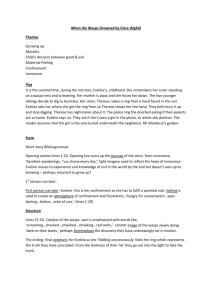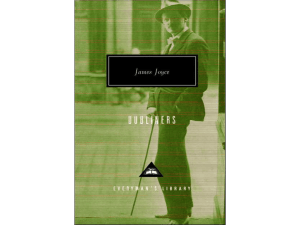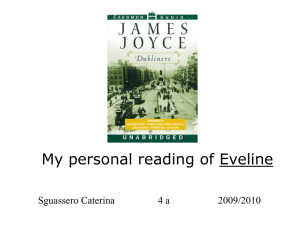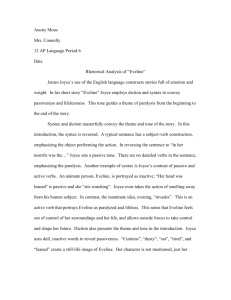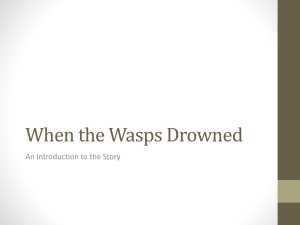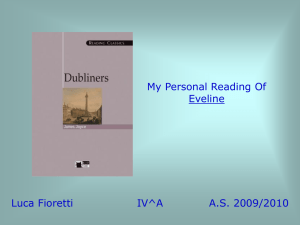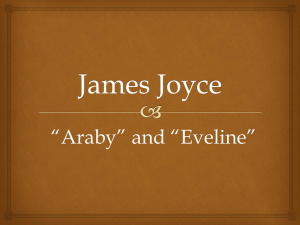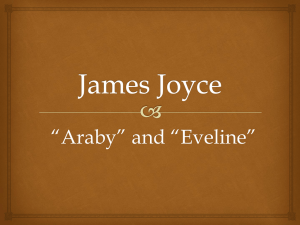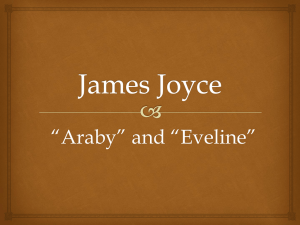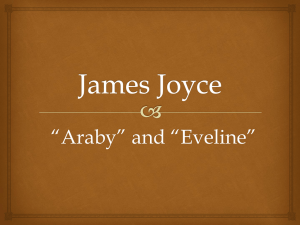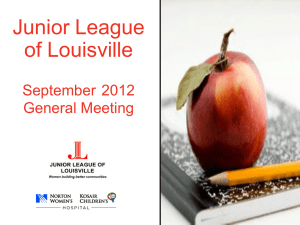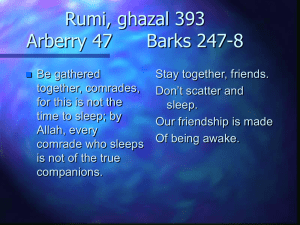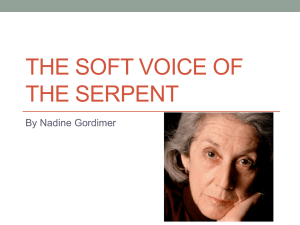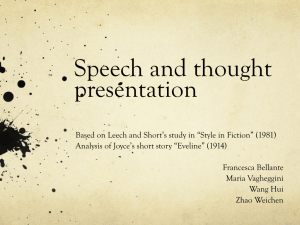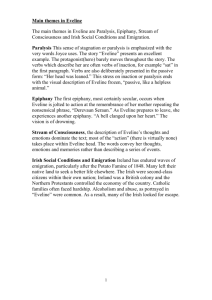When the Wasps Drowned Analysis - WordPress
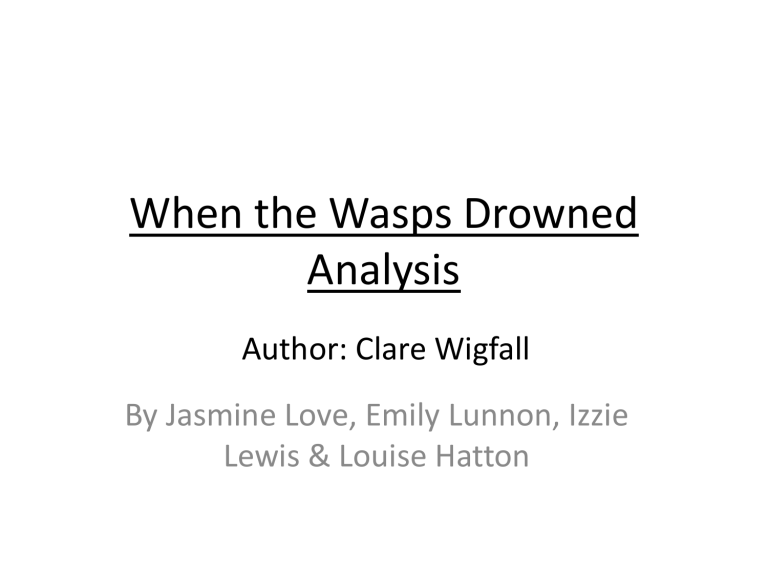
When the Wasps Drowned
Analysis
Author: Clare Wigfall
By Jasmine Love, Emily Lunnon, Izzie
Lewis & Louise Hatton
A background on Clare Wigfall
• Clare Wigfall was born in Greenwich, London. During her early childhood, she moved to America and grew up in Berkeley,
California, before moving back to London.
• When she was 21, Faber and Faber offered her a publishing contract. Her debut collection of short stories The Loudest
Sound and Nothing was published in 2007 to excellent reviews.
• In 2008 she won the BBC National Short Story Award for 'The
Numbers', one of the stories from her collection. She was also longlisted for the 2008 Frank O’Connor International Short
Story Award.
• She began writing at an early age. After an early role as assistant and editor to the late President of Mensa , she graduated from the University of Manchester in 1998.
When the Wasps Drowned
• ‘When the Wasps Drowned’ is part of Wigfall’s debut short story collection, The Loudest Sound
and Nothing. Often, the characters in Clare
Wigfall’s stories appear to be searching for something and as they go about their seemingly ordinary lives, a dark or sinister aspect of life is revealed.
• The idea of absence and things lost is the main theme of her writing. Even when lost things are found (like the body in ‘When the Wasps
Drowned’), there isn't a happy ending.
In what way is the title suitable for the story?
• The title of the story doesn’t give anything away, it leaves you wondering what the story will be about.
• The title is quite peculiar, usually you can tell the main theme of the story from the title but with this one you can’t.
• The title links to the inciting incident and not the actual climax or the rising action.
Who is the main character?
• The main character’s name is only mentioned once, her name is Eveline.
• She is the oldest sibling and she looks after her two younger siblings.
• Our view is that Eveline is around 14 years old[
L4].
How does the author handle characterisation?
• We learn about the characters only by name and Evelines name is only mentioned once, is this significant?
• She talks about what she is wearing whilst she is sunbathing.
• We learn that Tyler (younger sibling) has curly hair[L123].
Characterisation continued…
• There isn’t much conversation between the characters, for all of the story we are inside
Evelines head with her thoughts and feelings on the action.
• “I said finally” [L66] and “I said eventually”[L80] shows that she’s thinking about things in her own head, it also shows her authority.
• There is a lot of action in the story, but not much dialogue.
Who tells the story?
• The story is first person, its as if we are actually Eveline, we see everything from the point of view that she does.
Primary Action
The main, significant action of the story takes place in the garden, which represents:
• The confined life that Eveline lives in and how she has no means of escape from it
• The idea that what happens in the garden stays kept a secret within the garden
• The growing-up of the plants and the children within it
• The change from a safe, secure place to a dangerous one
Time Span
It isn’t made explicit exactly how much time the story covers, but we can assume that it covers the majority of the summer holidays:
• “It was maybe early August when”
• “The holidays began finally to peter to a close”
• Page breaks
Inciting Incident
The inciting incident of the story occurs when
Therese discovers a wasp’s nest and the wasps come out and sting her, so Eveline drowns them with a hose pipe:
• The title ‘When the Wasps Drowned’ links to the inciting incident of the story rather than the primary one
• The event represents the danger, sadness and death to come in the climax and dénouement
• The nest represents the same confining concept as the garden
Rising Action
• The rising action is the action where we find out Tyler and Therese are digging a hole near the garden wall.
• This part of the story is only 4 paragraphs long, but the action is still significant.
• Only one of those paragraphs [L47] is actually about the digging the rest is just leading up to it and “setting the scene”.
Climax
The climax of the story occurs when Eveline sees the ring and the hand under the ground and the aftermath of this discovery:
• Disrupt in peace/happiness of the times in the garden
• They go inside the house rather than in the garden
Story ending
It is quite effective because it leaves the reader to think as they just act like nothing has happened and they seem oblivious to the crime at hand.
It does not satisfy the reader as it leaves unanswered questions and feels as though the story isn’t finished.
• Is the girl in the photo the same as the one buried in the garden?
• Will she ever be discovered
• Who is Mr Mordecai? Is he guilty of the murder?
• Why didn’t they tell the police about the girl?
Personality traits
Eveline is a caring figure in the story. This is made obvious through her everyday actions and mum-like role in the family.
For example,
‘Therese and Tyler both clinging to my legs’
‘ Taking Therese and Tyler by the hand’
Figurative Language
Metaphor: ‘hungry for conversation’
‘the long days melted’
Personification: ‘ache of cars’
Villain or hero?
The villain is only hinted to be Mr Mordecai but this is not clearly portrayed.
Eveline, the main character did some heroic actions at times such as ‘I turned the hose on her’.
Relating to characters
We can all relate to the main character, Eveline and her role of responsibility as we are the eldest sibling. Having to make decisions.
Also they are in their summer holidays and at times we can imagine the scorching hot weather with parents working and nothing to do.
General themes
Moods
• The story creates a very curious mood as it ends leaving the reader with a few unanswered questions.
• It also makes the reader feel excitement and
anxious as it uses sentences such as ‘That was the summer they dug up Mr. Mordecai’s garden’ and
‘We heard her screams from inside’.
• We also sympathise with the lifestyles of the main character Evelyn as most of us can put ourselves in her shoes.
Is the story realistic?
• “everything seemed an effort”
• “roll my eyes and turn the page of my magazine”
• “washing up the breakfast dishes, soaping them lazily”
What was your overall opinion of the story?
• Questions left unanswered
• Confusing at first/misleading
• You don’t expect the things that happen to happen(not predictable)
